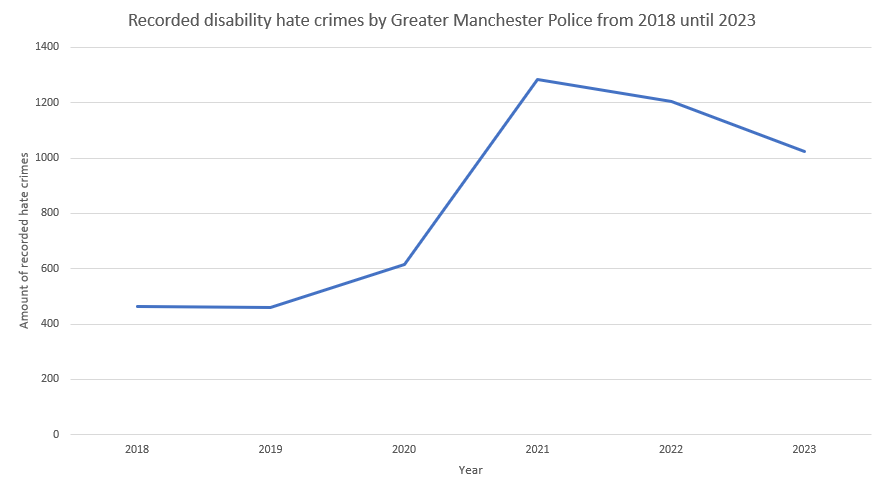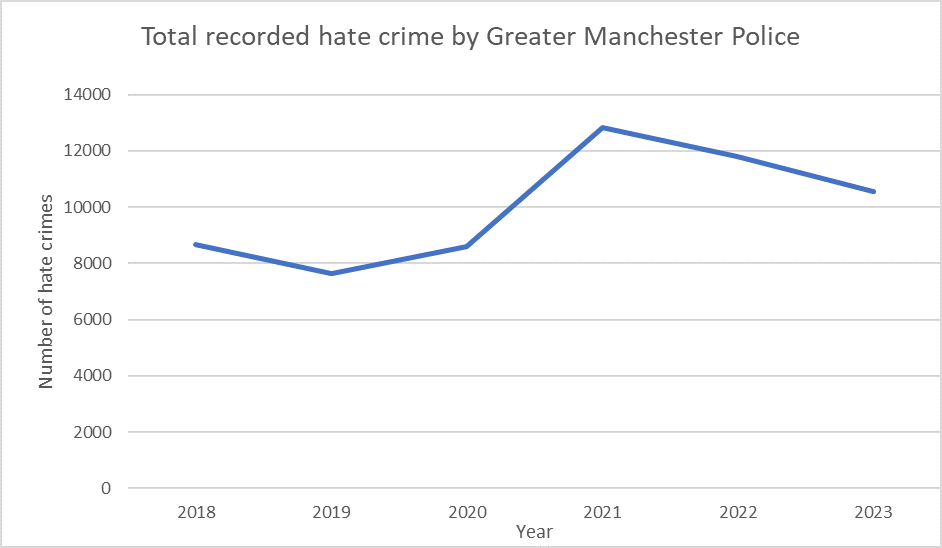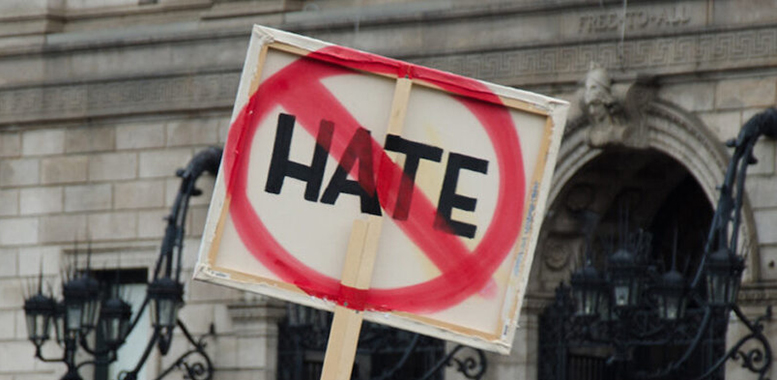Hate crimes against people with disabilities have more than doubled in the last five years in Greater Manchester according to new data – but the real figure could be a lot higher as many victims are reluctant to report their experiences.
Kerry Thompson, who has muscular dystrophy, was told she was a drain on society and she should have been aborted.
She would cry herself to sleep over the online abuse she received, but she never went to the police to report the vile messages.
Mrs Thompson said: “I’ve been told my life isn’t worth living because I have muscular dystrophy.
“Do I regret not reporting it? Absolutely. I will speak about it now, and I believe I would report it now because I think my mind set around the whole thing is very different.
“But because people don’t want to be a burden, or relive it and go through that trauma again, it goes unreported – also believing that the police are not going to do anything about it.
“There needs to be a better campaign from the police to encourage people to share and report their incidents more.”
In 2023, Greater Manchester Police recorded a total of 1025 hate crimes regarding disability. This is more than double the 2018 total, when there were 463 recorded.
However, since 2021, there has been a 20.2% decrease in recorded hate crimes regarding disability, since Greater Manchester Police recorded its peak at 1284.

And the 44-year-old’s belief that most hate crime is not report means that this decrease in hate crime towards people with disability cannot be viewed as progress in the police successfully combating the problem.
Sapphire Beamish, the press and media officer at the mental health and disability charity United Response, shares the view that the figure is likely to be much worse than reported.
Ms Beamish joined the organisation two years ago, and despite the slight decrease in recorded hate crimes, remains worried about this societal problem.
“This is only recorded hate crime,” she said – and stressed that reporting rates weren’t the only problem, either.
“One of the main issues is that there is such a low number of hate crime that actually makes it through to a charge or summons. People are looking at that, thinking, ‘Well, there is no outcome, and I might go through this process of reliving this trauma, but there is no guarantee that it may go anywhere’.”
Disability Hate Crime around Greater Manchester
Since 2018, every area of Greater Manchester has had a significant increase in recorded disability hate crime, the biggest being Wigan as figures tripled from 37 in 2018 to 133 in 2023.
The City of Manchester figure also tripled in that timeframe and has consistently had the most disability hate crimes recorded in the region each year since 2019 with 69 until 2023 with 212.
At its peak in 2021 eight areas in Greater Manchester recorded over 100 disability hate crimes including the City of Manchester, Salford, Tameside, Stockport, Bolton, Wigan, Rochdale, and Oldham.
In 2023 this had halved to four areas recording figures of over 100 including the City of Manchester, Salford, Bolton, and Wigan which could allow the argument that the police are combating the problem as shown in this decline.
But both Ms Beamish and Mrs Thompson both believe that more needs to be done by Greater Manchester Police.
Ms Beamish said: “It would be really helpful if police forces were given funding to create a bespoke disability liaison officer who is trained in disability awareness and engagement.
“And they can help support anyone that is trying to report a crime, so they feel they are taken seriously.”
While more can be done, Mrs Thompson would encourage anyone who suffers a hate crime to report it, as she knows the impact it can have.
She said: “It took me a long time to really understand that it wasn’t me, and for a long time it did affect me. I could have 20 other messages on a blog, but that one horrible message about me and essentially what is part of me, my muscular dystrophy; it is a part of me, but it doesn’t define me as a person.”
And so, others do not have to go through this in the future she wants to get to the root of this societal problem, suggesting that more needs to be done in educating people, particularly children.
The Muscular Dystrophy UK worker said: “Children are inquisitive and understanding; they are amazing, and some are smarter than we give credit. My niece and nephew understand that yes, I may be in a wheelchair, but they still treat me with the same love and care they have for everyone else.
“It is learned behaviour, and I think schools have a duty of care as well as parents to help educate young children about hate crime.
“There will be people telling children information about people with disabilities, that they are a drain on society, that they are taking all the benefits, and so on. This then creates a cycle of hate that will continue, and it is why we need to educate children that this is not true.”
Disability hate crime remains the least common category of recorded hate crime according to the GMP data despite doubling over the last five years, with 1,025 in 2023.
Racial hate crimes were the most frequent with 7,482 of the total 10,567 recorded hate crimes, with sexually oriented hate crimes coming in second and religious hate crimes in third with 1,616 and 1,026 respectively.
And similar to disability hate crime, the total number of hate crimes across Greater Manchester has been on the decline since its peak in 2021, when police recorded 12,837 compared to 10,567 in 2023.

But Mrs Thompson believes the decline is not a true representation, as many may not want to report the hate crime to the police, believe anything will be done about it, or even know what a hate crime is.
With the lack of swift action being taken regarding the hateful comments made by Frank Hester about Diane Abbott coming to light recently, Mrs Thompson worries massively about hate crime in the UK in the future.
She said: “We are not born to be racist or ableist; we are not born to hate, but it is a learned behaviour, and when you’ve got people in power doing absolutely nothing to combat it, then there will always be a systematic and societal problem.”
Featured image: Tim Pierce




